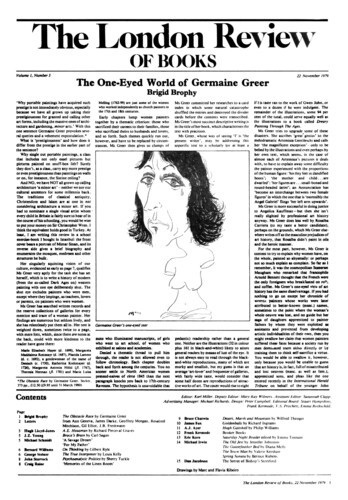Emma Tennant, former editor of the magazine Bananas, has produced a shiny package in the manner of an inter-war weekend book, but in a contemporary idiom to which no one can be indifferent.
Am I missing an extra layer of irony here or there? The sense of being mocked by initiates is heightened by the slow-dawning certainty that the Marcus Gutteridge talked to by John Mortimer is a made-up person, a chimera of all those doddering reminiscers (‘Aldous was extremely short-sighted’) whom young literary journalists feel obliged to interview. Well, of course, now I see it, and now that I’m in the joke very funny it is too. But it increases my doubts about Peter Wollen’s piece on Tina Modotti and Frida Kahlo, which is part of, which in fact comprises, that section of the anthology labelled ‘Women, Mexico, Revolution, Art’. Frida and Tina are, allegedly, revolutionary Mexican artistic women, linked also by their meeting in a Diego Rivera mural. We aren’t shown any of Frida Kahlo’s paintings, and though there are four photographs attributed to Modotti, the subjects (solarised calla lilies, a corner of a typewriter keyboard, people with fat bottoms at the zoo) are fairly universal. Wollen’s manner of discourse is astoundingly oblique: we learn about the women in fragments of letters between two other people. He quotes with approval Shklovsky: ‘I have the same attitude to a plot of the usual type as a dentist to teeth.’ (Shklovsky? Shklovsky? No, I’ve heard of him.) Suspicion, once sown, is hard to uproot. Beverly Treasure? Chelsea Herbert? Lloriston Grant? Caroline Blackwood and Robert Lowell have a conversation about Ford Madox Ford? (Well, all right, but what’s it doing among ‘Traveller’s Tales’?)
Chelsea Herbert is real too, and writes the best piece in the ‘Children in the City’ section: a funny, simple, and probably precise account of Saturday-night Jamaican Paddington. Mohammed Elbaja’s ‘My Life’ and Lloriston Grant’s ‘Arrival in Tottenham’ also achieve an artless expressiveness that doesn’t come just from being new to writing and new to standard English, but from talent, hard work and intelligent teaching.
But what to say of Hilary Bailey, whose story about an Amazonian herb which procures immortality is written as if the whole of 20th-century Science Fiction hadn’t happened: written as if for publication in the Strand Magazine for 1899? The self-consciousness of the style shows that it is artifice, not artlessness: ‘If it had not been for the shooting and the firing, the speeding and the general traffic violations I doubt if we would have got to Trafalgar Square.’ That was the dénouement. Elsewhere, Hilary Bailey writes: ‘But, unlike a car, a man tires.’ A sentence it would be impossible to set to paper if one didn’t want the response: ‘but a car tyres, too.’ This is in the section called ‘Tales of Adventure’. (I’m sorry to insist on these sub-headings, but the clamant lay-out calls attention to them.) Much the best thing here is Angela Carter’s ‘Captured by the Red Man’, the memoir of a consciousness-heightened Moll Flanders, an unashamed stylistic exercise that grips with the wit and authority of its diction. Even the idiosyncratic punctuation functions beautifully. Bruce Chatwin and Claud Cockburn both essay the discreet charm of Borges. ‘It should be clear, even to the most unobservant reader, that I am Maximilian Tod,’ writes the former. And the latter, a few pages on: ‘How is it known to this writer just what these thoughts were? It is known because – for I see it is necessary now to admit – I am Terne.’ Of the two, I found Cockburn the more gripping, for his other source of inspiration was Conan Doyle, while Chatwin’s was J.K. Huysmans, chalcedony and Delacroix.
There are only two ‘Tales of Horror’ and J.G. Ballard’s genteel jest about Benidorm becoming a vast concentration camp for the unemployed makes a pallid foil for Ted Hughes at his most flesh-eating. Hughes’s narrator is a hunter, tracking an undreamt-of assemblage of beasts natural and ominous. He has a brother, ‘criminal to the bone’ and possessed of unnatural teeth, who is slaughtered in the midst of the slaughtering, becomes a flayed head, becomes a pursuing demon, a bird, at last ‘a strange wife’ – the author’s understatement, not mine. The man pursued by a vengeful cranium recalls Wells’s ‘Pollock and the Porroh Man’, one of his most durable nightmares: but Hughes’s horrors are as far from Wells’s as Kampuchea from Ladysmith.
The nearest thing to a restful read is Kornei Chukovsky’s collected funny sayings of children; he is also the subject of an adulatory piece by Vera Traill. The Russian children are as cute as any children. Art Linkletter scored rather less of a critical success with a similar enterprise in the States; but then he didn’t have to survive Stalin – and Kornei Chukovsky did, triumphantly.
Poetry by Ruth Fainlight, Ted Hughes, Blok; more fiction, by Elaine Feinstein, John Sladek, Tim Owens; some cheerfully itchy artwork by Pamela Zoline, Rolf Brandt, and others; so much accomplishment, so much mere febrility. It’s unamiable, not to be ignored, and profoundly unsettling, like the ambiguous menu in John Sladek’s ‘The Next Dwarf’:
Pâté noir de Beeps
Lungfish titbits
Eissapfeln mit ‘Capered Bok’
Crème Hermes
Kidney ice
Black coffee with cologne.
Send Letters To:
The Editor
London Review of Books,
28 Little Russell Street
London, WC1A 2HN
letters@lrb.co.uk
Please include name, address, and a telephone number.

